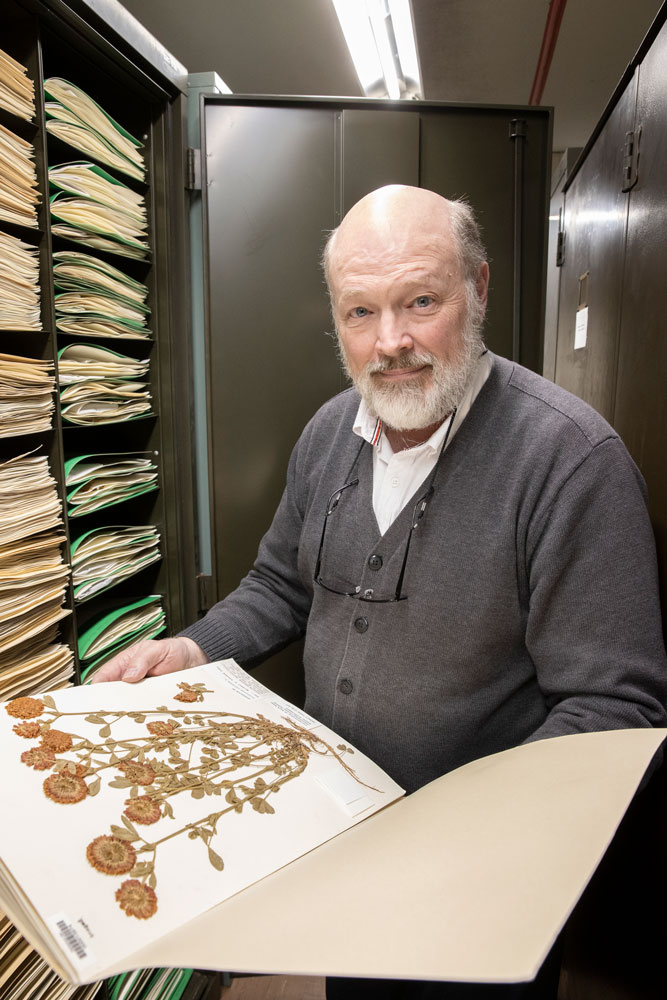Physical Address:
Upham Hall 79100 Bishop Circle
Miami University
Oxford, Ohio

The Herbarium supports many courses, ranging from lower-level undergraduate classes through graduate-level courses, including Field Botany (BIO 155), Ecology of North America (BIO 176), Plant Biology (BIO 191), Dendrology (BIO 205), Plant Taxonomy (BIO 302), Plant Diversity (BIO 314), Global Plant Diversity (BIO 431), as well as several specialized topical seminars. The herbarium also provides teaching resources to other departments and units of the institution upon request. Please contact the Curator (meierga@MiamiOH.edu) if you would like to request materials.
Because of the breadth of the holdings, many researchers from around the world have requested loans or specimen data, and many publications have been based on material borrowed from MU. Those borrowing the specimens included professional scientists, graduate students, and various agency personnel.
|
Richard Moore – Associate Professor As an evolutionary geneticist, I combine the fields of genomics, systematics, developmental genetics, and molecular evolutionary biology to discern the molecular mechanisms underlying the origin and evolution of morphological diversity. I am particularly interested in understanding the evolutionary and functional consequences of changes in plant genomes that have given rise to plant morphological and species diversity. By studying these processes on both genomic and functional levels, I hope to bridge the gap between genomics and the evolution of morphological diversity. I have focused my research efforts on microevolutionary processes that shape plant genomes in functionally relevant ways: 1) the evolution of sex chromosomes and sexual dimorphism; 2) the evolution of duplicate genes. Both of these processes exemplify how structural changes in the plant genome can lead to major innovations in plant development. Members of my lab have also addressed the role of transposable element proliferation in homoploid hybrid speciation as well the evolutionary processes that have shaped the structure of genetic and morphological diversity of natural plant populations. |
|
Michael Vincent – Curator Emeritus My research centers on taxonomy of Fabaceae, especially Trifolieae though I also study the spread of introduced species across the landscape. The floras of Ohio, North America and the Bahamas have always been a passion of mine as well as fungi and insects of Ohio.
|
|
Jonathan Bauer – Assistant Professor Our lab is focused on plant ecology, with particular interest in plant interactions with bacteria and fungi and application to ecological restoration and sustainable agriculture. Our research includes a combination of field experiments and observations, greenhouse experiments on plant community mesocosms, and laboratory analyses of soils and microbial communities. Ongoing projects include: Predictive Ecology – We are testing the mechanisms that shape the outcomes of ecological restoration, including the effects of management history, soil conditions, and plant × microbial interactions. With this understanding, we are working toward developing models that can forecast the outcomes of ecological restoration. Interacting Symbioses – Partnering with beneficial bacteria and fungi can be an essential strategy for plants to acquire nutrients. These partnerships can be affected both by competition among mutualists for the plant’s resources and by changes in the surrounding soil environment. Since many plant species of conservation concern are reliant on mutualisms with bacteria and fungi, understanding the context dependency of these mutualisms may improve our ability to restore these plants to degraded environments. Sustainable Agriculture – The productivity of crop plants can be strongly affected by microorganisms. We are beginning new research projects to understand how we can manage soils to promote beneficial microorganisms and limit the negative effects of soil pathogens. |
212 Pearson Hall
700 High St.
Miami University
Oxford, Ohio 45056
 Emeritus Curator, Michael Vincent, Ph.D.
Emeritus Curator, Michael Vincent, Ph.D.